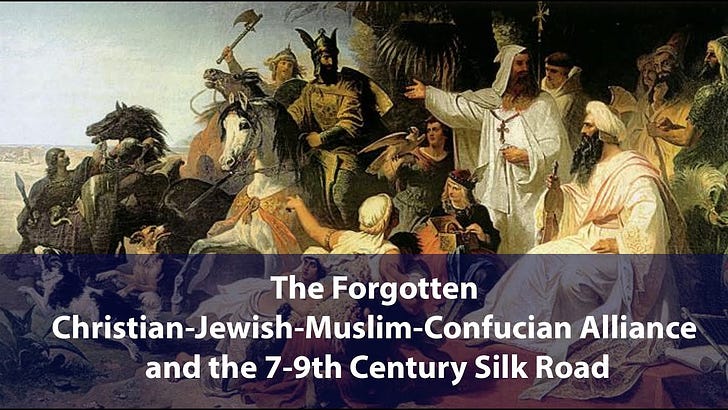In this Rising Tide Foundation lecture which develops upon the content of my recent essay ‘The Jewish-Christian-Muslim Alliance and China’s Silk Road’ published earlier this week on Substack, I introduce the story of the little known Turkic kingdom of Khazaria which converted to Judaism in the mid 8th century and which served as a keystone of the Tang Dynasty’s Silk Road revival as well as intermediary between the beautiful ecumenical alliance of the Abbasid Dynasty’s great Caliph Haroun al Rashid and the Carolingian Dynasty’s leader Charlemagne.
Within this class, the following questions are treated: How and why did this civilisation and broader ecumenical story get scrubbed out of history? How did the Venetian empire and other vestiges of the corrupt Roman Empire reorganise itself after Rome’s collapse and successfully undermine this peace of faiths by unleashing years of Crusades, Mongol invasions, inquisitions while simultaneously engineering a new bankers’ dictatorship after the 13th century that became a dominant force of evil in the world? How did such artists as Shakespeare, Christopher Marlowe and Schiller expose this side of the empire within their works in later years?
This lecture is part of a larger symposium titled “The Renaissance Principle in Universal History” and follows the previous week’s presentation “Life at the End of an Empire: St Augustine’s Fight to Save Platonic Christianity“.
Over the coming weeks, this important period of world history as well as the rise and power of the Venetian Empire will be explored from various angles.




One question that you did not even touch: How Khazaria turned jewish and was it really jewish?
Mike Harris and Preston James did answer this question in a way that many special people will not like very much:
https://www.veteranstoday.com/2022/03/10/the-hidden-history-of-the-incredibly-evil-khazarian-mafia/
"The Hidden History of the Incredibly Evil Khazarian Mafia"
by Preston James and Mike Harris
"100-800 AD – an incredibly Evil Society Emerges in Khazaria:
Khazarians develop into a nation ruled by an evil king, who had ancient Babylonian black arts, occult oligarchs serving as his court. During this time, Khazarians became known to surrounding countries as thieves, murderers, road bandits, and for assuming the identities of those travelers they murdered as a normal occupational practice and way of life.
800 AD – The Ultimatum is delivered by Russia and other surrounding nations:
The leaders of the surrounding nations, especially Russia, have had so many years of complaints by their citizens that, as a group, they deliver an ultimatum to the Khazarian king. They send a communique to the Khazarian king that he must choose one of the three Abrahamic religions for his people, make it his official state religion and require all Khazarian citizens to practice it, and socialize all Khazarian children to practice that faith.
The Khazarian king was given a choice between Islam, Christianity, and Judaism. The Khazarian king chose Judaism and promised to stay within the requirements laid out by the surrounding confederacy of nations led by the Russian czar. Despite his agreement and promise, the Khazarian king and his inner circle of oligarchs kept practicing ancient Babylonian black magic, also known as Secret Satanism. This Secret Satanism involved occult ceremonies featuring..."
Hello,
Thank you for sharing this presentation openly. I have a couple of clarification questions I'd like to ask.
Firstly, what is the source of portrait of king Bulan used in this presentation? This very image is actually often referred to as the image of Volodymyr the Great, ruler of Kievan Rus, as it was used in hryvna's banknote in 1992:
https://upload.wikimedia.org/wikipedia/commons/3/3c/1Hryvna-1992%281996%29-donatedoy_f.jpg
This image was drawn by Ukrainian artist:
https://en.wikipedia.org/wiki/Vasyl_Lopata
So I wonder what is the source claiming that this image shows king Bulan instead.
From this video, I got a general impression that you tend to believe that Khazaria was a place of tolerance and perhaps even ecumenism and humanism. If so much of history of Khazaria has been lost, is there any actual evidence that demonstrates that? In this presentation, the only thing that sounded certain to me is participation of Khazaria in trade routes of Silk Road, which on its own doesn't necessarily imply anything about the worldview and internal affairs of Khazaria.
Thanks.